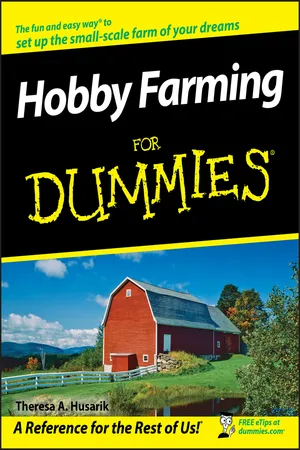
- English
- ePUB (mobile friendly)
- Available on iOS & Android
Hobby Farming For Dummies
About this book
Do you long for the country life??Get back to nature and feel your toes in the dirt with this friendly guide to a new farming lifestyle
Don't know the first thing about how to handle the basics of small-scale farming, from growing healthy crops to raising livestock and managing your property? Hobby Farming For Dummies is the no-nonsense guide you need to decide what to farm, find the right piece of property, set up utilities, select plants and livestock, protect your investment, and so much more.
You'll get a realistic look into what it really means to move from your current lifestyle to a life farming in the countryside, starting with figuring out if the farming lifestyle is right for you. From what you need to know about maintaining country property to how to access a power supply, you'll get help with major decisions of hobby farming:
- Whether you're better off with subsistence farming or a more ambitious project
- Which outbuildings you'll need for shelter and storage
- What tools are best for various types of farm labor
- Which animals you want to raise and care for
- Where to buy the land and how to acquire it
This comprehensive and user-friendly guide also shows you how to:
- Avoid common farming pitfalls
- Choose plans for your farm
- Get along with your neighbors
- Maintain your equipment and machinery
- Raise and care for animals, including caring for sick or injured animals
- Get creative by turning fiber into scarves and making cheese or yogurt
- Enrich your soil with manure and compost
- Reap the benefits of preserving fruits and vegetables
Additionally, you can read about opportunities for fun in country communities and the top ten misconceptions about farm living.?Grab a copy of Hobby Farming?For Dummies ?and discover how you can live the simple life.
Information
Part I
Hobby Farms 101

Chapter 1
Heading for the Country
In This Chapter



Analyzing the Lifestyle
Looking at some drawbacks
Looking at a few rural benefits
Envisioning Your Farm
Size matters: Comparing a small hobby farm to a for-profit operation
Table of contents
- Title
- Contents
- Introduction
- Part I : Hobby Farms 101
- Chapter 1: Heading for the Country
- Chapter 2: Before Taking the Plunge: Is This the Life for You?
- Chapter 3: Finding Your Place in the Sun
- Chapter 4: Getting Along with Your Neighbors
- Part II : Down on the Farm: Getting Your Property in Order
- Chapter 5: Getting Out of the House: Outbuildings and Enclosures
- Chapter 6: Gearing Up with the Right Tools, Clothes, and Equipment
- Chapter 7: Saving, Using, and Making Power on the Farm
- Chapter 8: Managing and Accessing Your Land and Natural Resources
- Part III : Calling In the Critters: What’s a Farm without Animals?
- Chapter 9: What Kinds of Critters Should You Get?
- Chapter 10: Acquiring Animals for Your Farm
- Chapter 11: Caring for and Feeding Your Animals
- Chapter 12: Critter Care: Providing Medical Attention for Your Animals
- Part IV : Choosing and Growing Plants and Crops
- Chapter 13: Deciding What and How Much of It to Grow
- Chapter 14: Getting Those Plants Started
- Part V : Using the Fruits of Your Labor
- Chapter 15: Preserving and Using Food Items
- Chapter 16: Where’s the Beef? From Hoof to Table
- Chapter 17: Preparing Fiber and Making Crafty Goods
- Chapter 18: Dealing with the Less Desirable Stuff
- Part VI : The Part of Tens
- Chapter 19: Ten Opportunities for Community Fun
- Chapter 20: Ten Misconceptions about Farm Living
- Part VII : Appendixes
- Appendix A: Helpful Resources
- Appendix B: Glossary
- : Further Reading